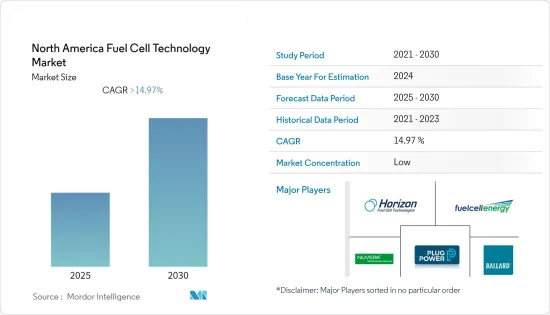Need help finding what you are looking for?
Contact Us
PUBLISHER: Mordor Intelligence | PRODUCT CODE: 1628759

PUBLISHER: Mordor Intelligence | PRODUCT CODE: 1628759
North America Fuel Cell Technology - Market Share Analysis, Industry Trends & Statistics, Growth Forecasts (2025 - 2030)
PUBLISHED:
PAGES: 100 Pages
DELIVERY TIME: 2-3 business days
SELECT AN OPTION
The North America Fuel Cell Technology Market is expected to register a CAGR of greater than 14.97% during the forecast period.

The market was negatively impacted by COVID-19 in 2020. Currently. The market has reached pre-pandemic levels.
Key Highlights
- Over the long term, the advantages of fuel cells over their alternatives, such as lithium-ion batteries, government initiatives, and private investment support, are expected to drive the market studied.
- On the other hand, the availability of proven and cost-effective alternate energy storage systems and the lack of hydrogen supply infrastructure are expected to restrain the market during the forecast period.
- Nevertheless, pure battery vehicles cannot cover all the route, load, and refueling requirements; therefore, fuel cells are a practical solution for trucks to maintain a place. Thus, this is expected to provide an excellent opportunity for the fuel cell technology market in the near future.
North America Fuel Cell Technology Market Trends
Polymer Electrolyte Membrane Fuel Cell (PEM) to Dominate the Market
- PEM fuel cell used for electrical power generation continues to dominate the stationary application, while household heat and power are nascent. During 2018, trucks and other heavy vehicles have increasingly started the significant application of PEM fuel cells.
- Among the various types of support materials, carbon black (Vulcan XC -72) has been widely used in PEM fuel cells due to its high electrical conductivity and specific area. However, it suffers from electro-oxidation under fuel cell operating conditions, resulting in the loss of catalytic activity after long-term operation.
- The North American region (primarily the United States) is one of the early adopters of the commercial-scale deployment of polymer electrolyte membrane (PEM)-based fuel cells. It was supported by government funding and had an increased uptake by end-users like the automobile industry.
- California Energy Commission's Alternative and Renewable Fuel and Vehicle Technology Program, a government initiative in 2013, established long-term plans to develop 100 retail hydrogen stations by 2021-22. This has encouraged the private sector to invest in the fuel cell market.
- As of 2021, around 11,956 fuel cells, including PEM fuel cells, powered light-duty vehicles were on the road in California. California has 115 retail hydrogen stations in development as of 2021.
- Therefore, development and government support are expected to drive the PEM fuel cell technology market in the region.
United States is Expected to Drive the Market
- The United States leads the global fuel cell electric vehicle (FCEV) deployed worldwide, and as of 2021, there were more than 535.6 MW of fuel cell stationary power, serving more than 40 states in the United States.
- California leads the deployment, where the Zero Emission Vehicle Program has significantly supplemented FCEV sales and is expected to remain the same in the coming years.
- PEM remains the dominant chemistry for the transportation sector in the country, though both DMFC and SOFC variants of vehicle systems are under development. Automotive giants, such as Toyota and Hyundai, have ventured into PEM stack cell technology to reduce the overall production costs of FCEVs.
- Besides, more than 80% of the fuel cell systems deployed in the United States are expected to be for the transportation sector. The cumulative number of fuel-cell electric vehicles in the United States grew from 4 in 2012 to 14,435 in 2022 till October.
- In May 2022, Hyundai Motor Company emphasized its plan to ramp up the United States commercial vehicle market entry with XCIENT Fuel Cell trucks at the 2022 Advanced Clean Transportation (ACT) Expo.
- Such collaborative efforts by the government and industry players are expected to significantly reduce PEMFC and FCEVs' costs and, in turn, increase the demand for fuel cells in the country.
North America Fuel Cell Technology Industry Overview
The North American fuel cell technology market is fragmented. Some of the key players are (in no particular order) Ballard Power Systems Inc., Horizon Fuel Cell Technologies Pte Ltd, FuelCell Energy Inc., Plug Power Inc., and Nuvera Fuel Cells LLC.
Additional Benefits:
- The market estimate (ME) sheet in Excel format
- 3 months of analyst support
Product Code: 53310
TABLE OF CONTENTS
1 INTRODUCTION
- 1.1 Scope of the Study
- 1.2 Market Definition
- 1.3 Study Assumptions
2 EXECUTIVE SUMMARY
3 RESEARCH METHODOLOGY
4 MARKET OVERVIEW
- 4.1 Introduction
- 4.2 Market Size and Demand Forecast in USD billion, till 2027
- 4.3 Recent Trends and Developments
- 4.4 Government Policies and Regulations
- 4.5 Market Dynamics
- 4.5.1 Drivers
- 4.5.2 Restraints
- 4.6 Supply Chain Analysis
- 4.7 Porter's Five Forces Analysis
- 4.7.1 Bargaining Power of Suppliers
- 4.7.2 Bargaining Power of Consumers
- 4.7.3 Threat of New Entrants
- 4.7.4 Threat of Substitutes Products and Services
- 4.7.5 Intensity of Competitive Rivalry
5 MARKET SEGMENTATION
- 5.1 Application
- 5.1.1 Portable
- 5.1.2 Stationary
- 5.1.3 Transportation
- 5.2 Fuel Cell Technology
- 5.2.1 Polymer Electrolyte Membrane Fuel Cell (PEMFC)
- 5.2.2 Solid Oxide Fuel Cell (SOFC)
- 5.2.3 Other Fuel Cell Technologies
- 5.3 Geography
- 5.3.1 United States
- 5.3.2 Canada
- 5.3.3 Rest of North America
6 COMPETITIVE LANDSCAPE
- 6.1 Mergers and Acquisitions, Joint Ventures, Collaborations, and Agreements
- 6.2 Strategies Adopted by Leading Players
- 6.3 Company Profiles
- 6.3.1 Ballard Power Systems Inc.
- 6.3.2 Horizon Fuel Cell Technologies Pte. Ltd
- 6.3.3 FuelCell Energy Inc.
- 6.3.4 Hydrogenics Corporation
- 6.3.5 FuelCell Energy Inc.
- 6.3.6 Plug Power Inc.
- 6.3.7 Nuvera Fuel Cells LLC
7 MARKET OPPORTUNITIES AND FUTURE TRENDS
Have a question?


SELECT AN OPTION
Have a question?


Questions? Please give us a call or visit the contact form.
